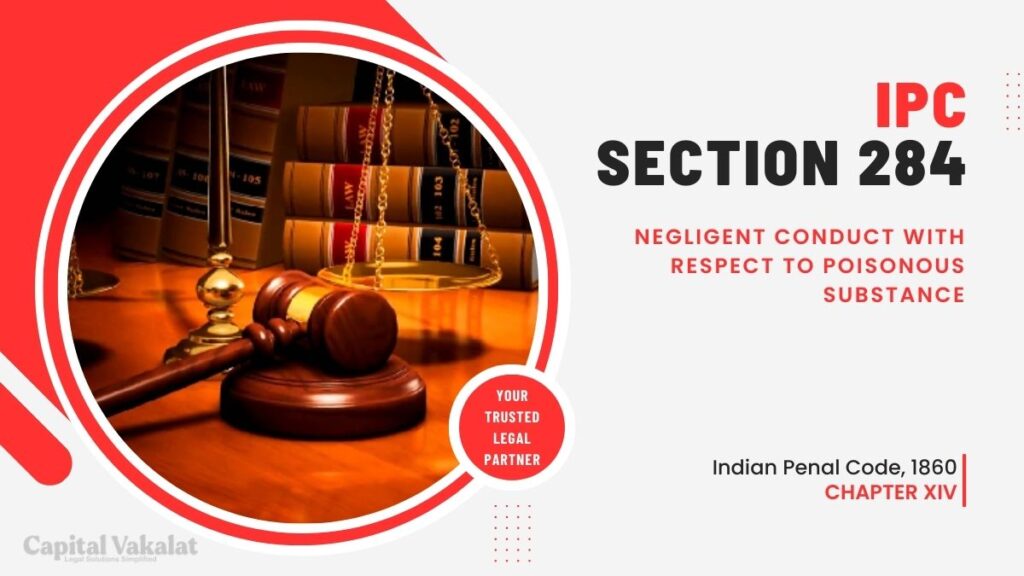In this article, we will delve into the legal aspects surrounding Section 284 of the Indian Penal Code (IPC), which pertains to negligent conduct with respect to poisonous substances. This provision plays a crucial role in ensuring the safety and well-being of individuals and communities when handling or dealing with potentially harmful substances.

We’ll explore the nuances, implications, and significance of this section, and provide insights into its application and relevance in contemporary society.
Introduction to Section 284 IPC
Section 284 IPC is a part of India’s legal framework that deals with offenses related to the negligent handling of poisonous substances. It aims to prevent accidental harm and protect the environment by regulating the conduct of individuals and entities that deal with such substances. Negligent conduct in this context refers to actions or omissions that result in harm due to a lack of reasonable care.
Understanding Negligent Conduct with Respect to Poisonous Substance
Negligent conduct with respect to poisonous substances involves situations where individuals or entities fail to exercise the necessary precautions and care when dealing with toxic materials. This negligence can result in severe health hazards, environmental damage, or even loss of life. Understanding the gravity of such conduct is vital in appreciating the importance of Section 284 IPC.
Key Elements of Section 284 IPC
To be convicted under Section 284 IPC, several key elements must be established, including the presence of a poisonous substance, negligent conduct, and actual harm or the potential for harm. The section emphasizes the need for a causal link between the negligent conduct and the consequences that follow.
Consequences of Violating Section 284 IPC
Violating Section 284 IPC can lead to significant legal consequences, including fines and imprisonment. These penalties are designed to deter individuals and entities from engaging in careless or reckless actions that could result in harm.
Case Studies of Section 284 IPC Violations
To illustrate the real-world implications of Section 284 IPC, we will examine notable case studies where negligent conduct with respect to poisonous substances led to serious consequences. These cases serve as cautionary tales and highlight the importance of adhering to this legal provision.
Defenses and Mitigating Factors
Individuals or entities accused of violating Section 284 IPC may have defenses or mitigating factors that can be used to reduce the severity of their legal liability. We will explore these defenses and factors, such as the absence of negligence or the presence of extenuating circumstances.
Significance of Section 284 IPC
Section 284 IPC holds significant importance in ensuring public safety and environmental protection. It acts as a deterrent against reckless behavior and encourages responsible conduct when dealing with poisonous substances. We will discuss the broader implications of this provision and its contribution to a safer society.
Ensuring Compliance with Section 284 IPC
For individuals and entities handling poisonous substances, compliance with Section 284 IPC is essential. We will provide practical guidance on how to ensure compliance, including risk assessment, safety protocols, and employee training.
International Perspectives on Poisonous Substances Regulation
We will also explore how India’s approach to regulating poisonous substances compares with international standards and practices. Understanding the global context can shed light on potential areas for improvement and alignment with international norms.
Conclusion
In conclusion, Section 284 IPC plays a crucial role in safeguarding individuals and the environment from the potential hazards associated with poisonous substances. It is imperative that all stakeholders, including individuals, businesses, and government bodies, understand and adhere to this legal provision. By doing so, we can create a safer and more responsible society.
Frequently Asked Questions
Can accidental exposure to poisonous substances lead to prosecution under Section 284 IPC?
Accidental exposure may lead to prosecution under Section 284 IPC if it is determined that the exposure resulted from negligent conduct rather than a genuine accident.
Are there any exceptions to liability under Section 284 IPC for certain industries or professions?
Some industries or professions may have specific regulations or guidelines that apply to the handling of poisonous substances. However, negligence leading to harm is generally not exempt from prosecution.
How can businesses ensure compliance with Section 284 IPC?
Businesses can ensure compliance by implementing safety measures, conducting regular risk assessments, providing employee training, and adhering to relevant environmental and safety regulations.
What is the maximum penalty for a violation of Section 284 IPC?
The maximum penalty for a violation of Section 284 IPC may include imprisonment and substantial fines, depending on the severity of the offense and the resulting harm.